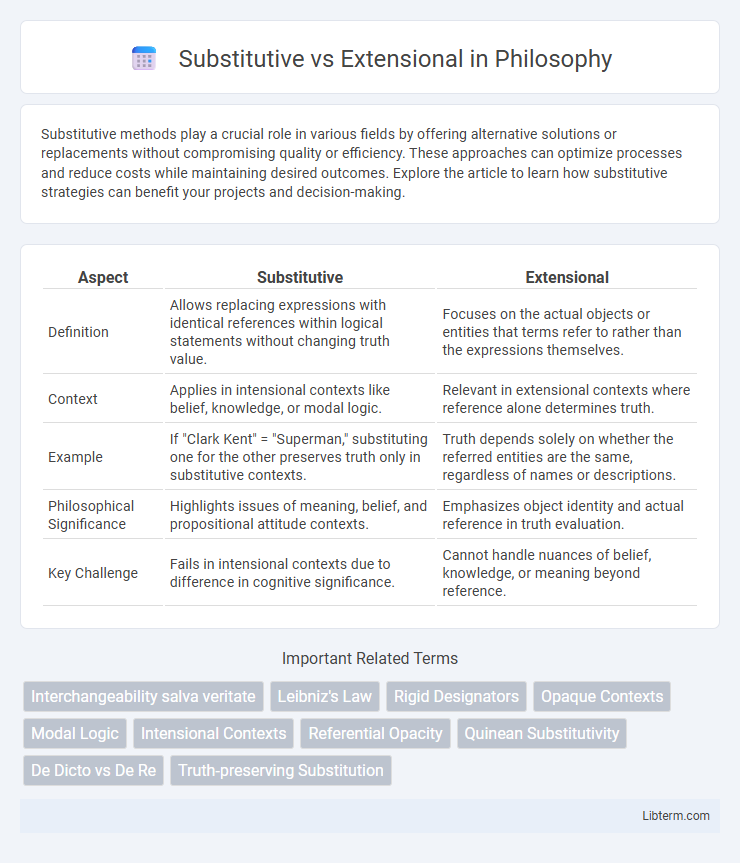Substitutive methods play a crucial role in various fields by offering alternative solutions or replacements without compromising quality or efficiency. These approaches can optimize processes and reduce costs while maintaining desired outcomes. Explore the article to learn how substitutive strategies can benefit your projects and decision-making.
Table of Comparison
| Aspect | Substitutive | Extensional |
|---|---|---|
| Definition | Allows replacing expressions with identical references within logical statements without changing truth value. | Focuses on the actual objects or entities that terms refer to rather than the expressions themselves. |
| Context | Applies in intensional contexts like belief, knowledge, or modal logic. | Relevant in extensional contexts where reference alone determines truth. |
| Example | If "Clark Kent" = "Superman," substituting one for the other preserves truth only in substitutive contexts. | Truth depends solely on whether the referred entities are the same, regardless of names or descriptions. |
| Philosophical Significance | Highlights issues of meaning, belief, and propositional attitude contexts. | Emphasizes object identity and actual reference in truth evaluation. |
| Key Challenge | Fails in intensional contexts due to difference in cognitive significance. | Cannot handle nuances of belief, knowledge, or meaning beyond reference. |
Introduction to Substitutive and Extensional Concepts
Substitutive and extensional concepts represent two distinct approaches in semantics and logic for interpreting expressions. Substitutive concepts allow terms to be replaced by co-referential expressions within statements without altering truth values, reflecting intensional contexts such as belief or necessity. Extensional concepts depend on the actual reference or extension of terms, where substitution is valid only if the terms refer to the identical entity in the real world, emphasizing object-level truth conditions.
Defining Substitutive Interpretation
Substitutive interpretation refers to the semantic approach where a term or phrase can be replaced by another with the same reference without changing the truth value of a sentence. This contrasts with extensional interpretation, which emphasizes the actual set or extension a term denotes in a model or domain. Understanding substitutive interpretation is crucial in analyzing modal logic, intensional contexts, and the semantics of propositional attitude reports.
Understanding Extensional Interpretation
Extensional interpretation assigns meaning to expressions based on their actual referents or truth values in the real world, enabling precise evaluation of statements through concrete examples or sets. This approach contrasts with substitutive interpretation, which focuses on the syntactic replacement of expressions without necessarily considering their real-world references. Understanding extensionality is crucial in logic and semantics for analyzing how truth conditions depend on the specific entities involved rather than merely the form of expressions.
Key Differences Between Substitutive and Extensional
Substitutive refers to the ability to replace a term with another that has the same meaning without changing the truth value of a statement, typically seen in intensional contexts where meaning matters. Extensional involves substituting terms based solely on their reference or extension, focusing on objects or entities they denote regardless of meaning. Key differences center on whether substitution preserves truth in context (substitutive) or relies strictly on reference equivalence (extensional).
Philosophical Origins of Substitutive vs Extensional
The philosophical origins of substitutive and extensional contexts trace back to Frege's theory of sense and reference, distinguishing between the meaning of an expression and its referent. Substitutive contexts arise when the replacement of co-referential terms alters truth-values due to the intensional nature of the context, as exemplified in propositional attitude reports. Extensional contexts, grounded in classical logic, maintain truth preservation under substitution of identicals, reflecting a direct relationship between expressions and their referents without sensitivity to cognitive significance.
Practical Applications in Logic and Mathematics
Substitutive contexts allow the replacement of terms with identical referents without changing the truth value, which is critical in symbolic logic for simplifying expressions and proofs. Extensionality in mathematics underpins set theory by treating two sets as equal if they have the same elements, enabling rigorous definitions and operations. Practical applications include automated theorem proving, where substitutive rules optimize proof strategies, and formal verification, where extensional equality ensures consistent reasoning about program states.
Substitutivity in Linguistics and Semantics
Substitutivity in linguistics and semantics refers to the principle that expressions with the same reference can be exchanged without altering the truth value of a sentence in extensional contexts. This property enables the replacement of co-referential terms, such as proper names or definite descriptions, while preserving semantic equivalence. However, substitutivity fails in intensional or opaque contexts, where meaning depends on the sense or mode of presentation rather than mere reference.
Extensionality in Set Theory and Logic
Extensionality in set theory asserts that two sets are identical if and only if they have the same elements, forming the basis of the extensionality axiom. This principle contrasts with substitutive approaches by emphasizing membership and element equality rather than syntactic substitution of expressions. In logic, extensionality enables reasoning about functions and relations purely through their outputs or extensions, supporting rigorous formal proofs and model theory.
Challenges in Distinguishing Substitutive and Extensional
Distinguishing between substitutive and extensional contexts presents challenges due to the complexity of reference and meaning in language semantics. Substitutive contexts allow for the replacement of expressions with co-referential terms without altering truth values, whereas extensional contexts depend strictly on the actual referents in the domain of discourse. Ambiguities arise in modal logic, belief reports, and intensional contexts where the substitution of identical terms may change the semantic interpretation, complicating the identification and analysis of these contexts.
Summary: Choosing Between Substitutive and Extensional
Choosing between substitutive and extensional approaches depends on the context of meaning and reference precision. Substitutive methods prioritize preserving semantic content in various contexts, while extensional approaches focus on the actual entities or truth values associated. Effective application relies on balancing semantic fidelity with pragmatic clarity to optimize language processing.
Substitutive Infographic

 libterm.com
libterm.com